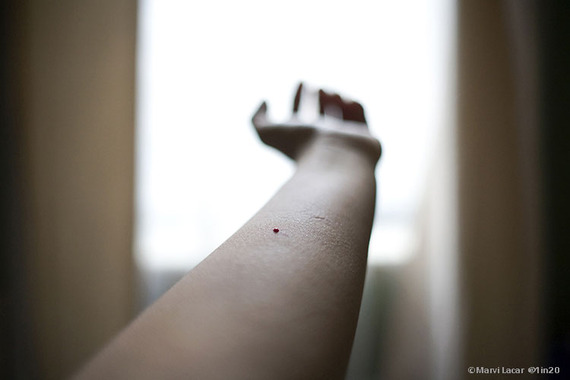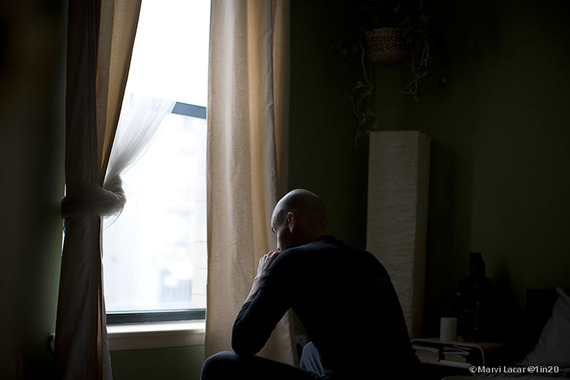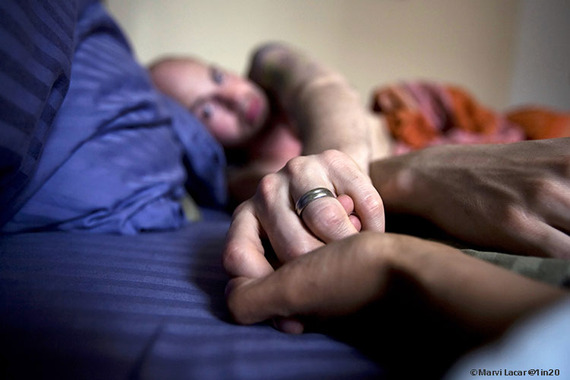Papa
I suspected that my father was manic-depressive after I started dating X. Both men were unpredictable, at times violent, thrilling and volatile but never dull. The only difference between my father and X was that X admitted he had the disorder; my father on the other hand would yell, "I'm not crazy!" after we found him sleeping on the bathroom floor because the marble tiles "felt cooler than the bed." How much of my father's dark moments were considered an episode or just plain flaw of character, I'll never know. He was never diagnosed.
My father was a brilliant sociologist. Charming yet too painfully manipulative to retain lasting relationships. He doted on me, but he was physically abusive to my mother. He was a polyglot whose vocabulary waned to a few choice disparaging words when his anger and paranoia took over. He taught me how to handle my first .45 caliber handgun at the age of twelve. As his mental illness worsened, I was compelled to lock myself in my room at night with the same gun, the bullets tucked away safely in a separate hiding place, like the knives and forks. My husband says, I have my mother's heart, but I've always known that I have my father's soul.
He was my mentor, my art critic, my coach, my curiosity, my wanderlust, my temper...my anger. He adored me and I idolized him. Though I feared him, I feared living my mother's fate more. I can't exactly pinpoint the day when I switched sides; when all I wanted to do was make my mother's life easier... when I stopped pitying her and saw my father for who he truly was. Eventually it dawned on me that mama wasn't my father's savior. Just as I couldn't have loved X more to save him from self-destruction, she couldn't have done more to make my father treat her with decency.
Through the years of silence, I remained my father's daughter. Of all his children, he chose to call only me on the 12th of March 2008. Maybe to say, "I'm sorry," or "I've forgiven you for abandoning me in my time of need," or "Fuck you for abandoning me in my time of need," or "Can you send more money," or maybe just, "Goodbye." I'll never know my father's parting words. I never picked up. I never called him back. On March 15, 2008 at approximately 5:00am GMT+8 my father passed away, alone in his hospital bed in the Philippines. He left instructions to be buried the next day. I never saw his face, but my cousin said he looked "pained." Three days after his burial, I was admitted to St. Luke Hospital's Psychiatric Ward. I was diagnosed with acute clinical depression.
Ben
I still remember the afternoon when Ben pushed my wheelchair past the double doors. "Do you think I'm crazy?" I asked. "Are you embarrassed of me?" Even though I knew he wasn't, I would have taken shame over what I saw in his face... fear and defeat. He left me with a pen, a notebook and my first generation iPhone. "Document this," he suggested. From then on, I chronicled the scenes and objects I fixated on during my illness, the conversations of import and the moments of levity. Through the years, I compiled a diary of my unraveling and my journey back to that place of peace. Some days that space completely evades me; but I have Ben.
What saved us wasn't valor or tenacity. Ben is not a martyr or a masochist. He understood my battle because he was in my shoes as a teenager. Sometimes empathy can be the last strand left to grasp when hanging on the verge. It is a gift not many are able to give, but something everyone seems to crave. Ben and I survived the hardest part of our marriage not because of sheer commitment. Ours isn't a love story fodder for poets. It is neither epic nor tragic. We survived because he was willing to look at me, free of judgement. On days when I was bereft of all self-worth, I could tell he still saw me in a different light. That recognition from him, was enough to make me want to decipher his own vision of me. He would offer saccharine encouragements -- varying iterations of "If only you could see yourself the way I see you," -- to which I usually responded with a snort. Obviously, I didn't. Actually, I probably still don't, but it piques my curiosity enough to want to figure out whether I can really be that person. So I push on...
1in20
For every twenty or so individuals who attempt suicide, one person dies. The World Health Organization has stated that depression is the leading cause of disability worldwide. It has become a serious public health issue. If one out of five people are bound to experience depression at some point in their lives, then this is no longer my story to tell, but ours. For this reason, I decided to start 1in20, a platform that contributes to the efforts to destigmatize the subject of mental illness by facilitating candid and non-judgmental conversations through social media. Everyone can contribute. 1in20 can be a source for sufferers, loved ones, doctors, researchers and academics. My role in 1in20 will vary from photographer, curator, editor, art director depending on the commitment and the artistic inclinations of the contributors.
My experience and passion lie in highlighting the informative and therapeutic role of art. When I was emotionally vacant, I basked in the evocative power of movies and lyrics. When I fell silent, I spoke through my camera. When I was too drained to interact with the world, I experienced life through literature. During these critical moments, art bought me time to think with calm and perspective and reject an irrevocable act of desperation.
I believe in the value of sharing these stories. Some images may be jarring but for those who have had experiences with such turmoil, empathy is a welcome relief. I myself found the the connection I yearned for in the artists whose works accompanied me throughout my isolation. Through their attempt at self-expression, I understood that I was not an anomaly, my existence isn't random and that I am as resilient as I am fragile.


